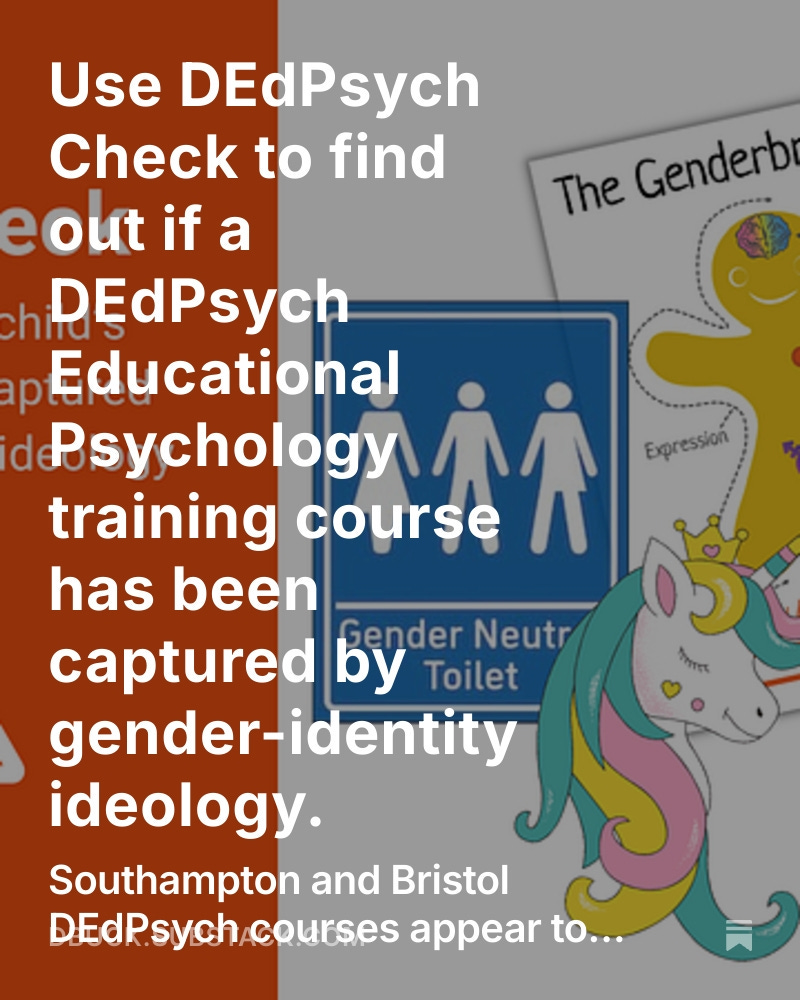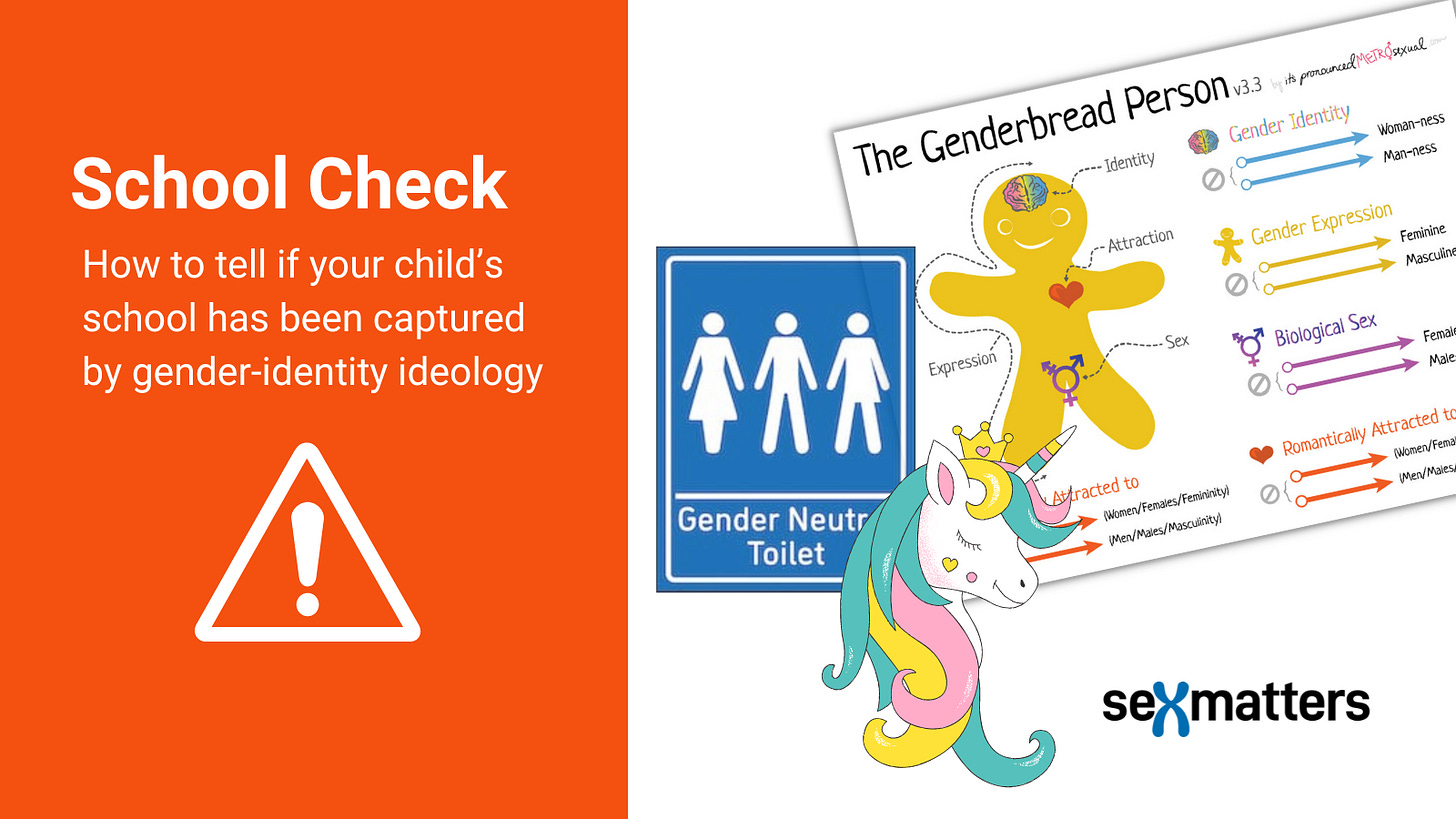Use DEdPsych Check to find out if a DEdPsych Educational Psychology training course has been captured by gender-identity ideology.
Southampton and Bristol DEdPsych courses appear to fail this check as each has tutors committed to the mysogynistic and homophobic support for “gender-affirmation”, including “social-transitioning”!
Just swap “DEdPsych” for “School” in this School Check to find out if a school has been captured by gender-identity ideology
There are a lot of suggestions here, but just do as much as you have time for. Some parts may be easier for you than others – but even if you have only looked in a few places, it’s still worth approaching the school.
You might like to start with our summary, and Helen Joyce’s article for the Mail Online about how her son’s school dealt with her complaint.
Policies
All the bullet points we list here are danger signs.
Equality policy
Check the school’s website for its Equality Policy (which may be called something slightly different, such as “Equality and Inclusion” or “Equalities”). If it’s a maintained school there should definitely be one, since complying with the Public Sector Equality Duty is a statutory requirement; a private school will usually have something similar.
What to watch out for in an equality policy
Does it list “gender” or “gender identity” as protected characteristics in the Equality Act, instead of “sex” and “gender reassignment” with the correct definitions?
Does it talk about “gender identity” or “trans identities” or “trans children”?
Does it mix up sex (binary, immutable, male and female, boy and girl) and gender identity (a personal declaration unmoored from physical reality, which shouldn’t appear at all)?
Does it suggest that “intersex” is an identity?
Does it claim that pupils are boys or girls according to how they identify?
Does it mention non-binary identities?
Equality objectives
See if you can find these on the school website.
What to watch out for in equality objectives
Anti-bullying policy
Every maintained school should have such a policy easily accessible on its website, and private schools are likely to have something similar.
What to watch out for in an anti-bullying policy
Trans-inclusion policy
Look on the school’s website for a policy called something like this – it is not a statutory requirement, but increasingly many schools have such a policy.
What to watch out for in a trans-inclusion policy
Equality impact assessment
If there is a “trans inclusion” policy, then an EIA should have been carried out. It may be included at the end of the policy or published separately.
It should explain how the policy impacts on people with various protected characteristics, and if that impact is negative whether action needs to be taken.
If any of the answers above for the trans inclusion policy suggest that gender-confused children’s gender identity is being given precedence over sex, look to see what the EIA says is the impact on the relevant group (probably girls, and people with “sex-realist” beliefs, whether religious or secular). Does it acknowledge an impact, and if so what does it propose to do?
If you cannot find one of these policies
If you can’t find one of these other than the trans-inclusion policy, ask the principal’s office to direct you to it.
If there is no trans-inclusion policy
Facilities
Is there single-sex provision for toilets and changing rooms in addition to any mixed-sex (or “gender neutral” or “unisex”) facilities?
If not, are the mixed-sex toilets completely enclosed, including sinks, and opening onto a well-trafficked area? Or are the sinks outside the cubicles, or do the cubicles open onto a side corridor behind a door and poorly overlooked?
Social transition
Are you able to tell from published policies what the school’s policies are regarding the elements of social transition? If not, ask the school to tell you what its policy is regarding any steps you cannot answer.
Here is a breakdown of the steps, with an analysis of which can and cannot lawfully be accommodated in a school environment. If the school takes any steps that are not lawful, these can be complained about.
Steps involved in “social transition”
Data and record-keeping
If the school has a “trans inclusion policy”, it may answer these questions. If not, ask directly:
If the school seems very enthusiastic about trans issues, consider asking:
External partners and materials for RSE/PSHE
Check the school’s RSE policy, which should set out details of provision and curriculum including information about external resources.
Ask if the school uses any outside partners or materials provided by external organisations for RSE/PSHE lessons on issues of sex and trans identities. If so, ask which ones, and ask to see the materials. The Department for Education has said schools should facilitate such requests, but some cite commercial confidentiality and refuse. If you cannot see the materials, see what you can find out about the organisation online.
Find out whether lesson plans, printed materials or books make suggestions like these:
Books
If the school presents a reading list or uses books in class, look to see what messages these books convey about sex and gender identity. What you’re looking for is anything that conveys these messages, even subtly.
There are far too many books like this to list; however, here are a few that give a flavour of the content:
Introducing Teddy, about a teddy bear who realises “in my heart I’ve always been a girl”. He shows this by taking off his bow tie and using it as a hair bow.
I am Jazz, a children’s book about reality-TV star Jazz Jennings, a boy who socially transitioned in early childhood and underwent genital surgery while still a teenager. Jazz’s parents decided their child was a girl because he liked girls’ clothes and boys.
Beyond the Gender Binary, a memoir by a drag queen who identifies as non-binary.
Transgender Trend has an excellent article about and comprehensive list of trans picture books for little children.
Staff training
Ask if staff have received any training on either LGBT issues or trans issues. If so, ask who provided that training, and if you can see the materials or a summary of them.
Does the training signpost to partisan external organisations such as Mermaids, Stonewall, Gendered Intelligence or the Proud Trust?
Ask if the school makes use of an Education Services Provider to help formulate its policies. Many schools lean on model policies heavily influenced by organisations that promote prioritising gender identity over biological sex.
Does the school acknowledge that it retains full responsibility for safeguarding even where advice has been outsourced?
Does what you learn suggest that staff are being told any of these inaccurate claims?
Also ask if staff have received any training on equality, diversity and inclusion relating to other protected characteristics, in particular religion/belief and disability. Again, ask who provided that training, and ask if you can see the materials or a summary of them.
What to look for in training materials
Premises
Is the school proselytising for trans identities?



